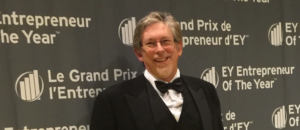
16 Feb 2008
Musings and Machinations
BLOG MANDATE Technology is a passion. I have, over the years, had the good fortune to work in researching key technologies, designing and building great products based on technologies, founding and growing great companies built around technology, and now investing (in a “hands-on” way of course) in great technology businesses. I also happen to have a passion for the arts, the environment and entrepreneurism. And, in recent years, business models, approaches and systems coming from technology-based business, is starting to transform the social sector. What used to be called philanthropy, is definitely becoming more business like and, in fact, the boundaries are blurring. Is innovative micro-lender Grameen Bank a charity or a profit making business? Well, to short change a long discussion, it is a bit of both. And, that’s what’s exciting about the new work of technology and the social sector. Rules are being broken, new businesses cannibalize old, and it is the human intellet, well applied, that wins the day. BLOG APPROACH I’m a pretty opinionated guy. And, I like nothing more than to share and debate those opinions. Feel free to give your (constructive please) feedback, insights […]

1 Feb 2008
Early 20th Century Avant Garde Music in the 21st Century
I just returned from an extraordinarily engaging concert hosted by Waterloo’s Numus, which featured New York-based and Austrian born Dorit Chrysler, who is one of the preeminent performance artists on the Theremin. She delivered on her promise to feature the broadest possible range from classical, avant garde, pop, jazz and even the “scary” music we often associate with this early electronic instrument. And, given the delicate body motions, almost like dance with fingering, the Theremin is indeed a very demonstrative instrument, at least in the right hands. Preceding her concert, the stage was set with the showing of the 1995 film “Theremin: An Electronic Odyssey” which was an amazing background in itself. I’ve seen the instrument played at a distance before, but since it was created in 1919, it can be considered the pioneer of modern electronic music to which we all should pay homage. If you’ve never heard Dorit or even the Theremin, check it out!
1 Oct 2007
[Book Review]: Computer Power and Human Reason
Computer power and human reason by Joseph Weizenbaum Published by W. H. FreemanWorldCat • LibraryThing • Google Books • BookFinder This was a seminal work in exploring themes of computing, artificial intelligence and the limits of technology by Joseph Weizenbaum, MIT professor and social thinker. He considered that computers will always lack human emotions and compassion, and that this would define the limits of how far technology should be allowed to progress. Joseph died in March 2008, having returned to his native Berlin, Germany. Having the most presentable car back in 1978, I was the natural choice to drive him from Toronto airport to a lecture at the University of Waterloo Computer Science Club. I recall with fondness an engaging conversation with Joseph, who was a brilliant, yet very approachable, person. I would also point people to an excellent documentary film on his life: Weizenbaum. Rebel at Work.
9 May 2007
[Book Review]: Founders at Work: Stories of Startups’ Early Days
Founders at Work by Jessica Livingston Published by ApressWorldCat • LibraryThing • Google Books • BookFinder The power of this book comes from the breadth of founders (more than 30) interviewed by Jessica Livingston whose startup success ranges from hardware, software and the web with examples from the 1980′s right up to this decade. Although, by celebrating primarily technical founders, it perhaps downplays some of the financial aspects of business growth, it is a powerful read. And, to be honest, the role of the technology based founder, which is the backbone of the Silicon Valley model needs to be better understood and celebrated. Most of the founders are forthright, with just a few exceptions, about the U turns and even failures that led to their ultimate success. All in all, a must read for any budding startup entrepreneurs.
8 May 2007
[Book Review]: Infotopia: How Many Minds Produce Knowledge
Infotopia by Cass R. Sunstein Published by Oxford University PressWorldCat • LibraryThing • Google Books • BookFinder Cass Sunstein is an incredibly original and clear thinker on the whole topic of human organization. At the cutting edge of how new digital technologies are allowing us to harness the “wisdom of the many”, this book is a must read to provide a 21st century take on human organization. It provides examples of the power of the group, but also ways in which group organization can go wrong. Managers of all business, technology-driven or otherwise, would do well to read this book. Thanks to Alec Saunders for recommending this book.
7 Apr 2007
[Book Review]: Wikinomics: How Mass Collaboration Changes Everything
Wikinomics by Don Tapscott and Anthony D. Williams Published by PortfolioWorldCat • LibraryThing • Google Books • BookFinder Don Tapscott presents another well thought out and lucid work on the digital revolution. This time, he focuses on how these digital technologies are fundamentally changing, and perhaps creating, new economic realities. It was published around the same time as the Web 2.0 techniques of user generated content, Wikis, open source, blogging, etc. were moving into a more mainstream position and starting to impact the business world. This book has a more technological focus than other books in this space, so I recommend reading alongside, say Friedman’s The World is Flat.
6 Mar 2007
[Book Review]: The World is Flat: A Brief History of the Twenty-First Century
The World Is Flat by Thomas L. Friedman Published by Thorndike PressWorldCat • LibraryThing • Google Books • BookFinder Thomas Friedman provides an excellent pairing to Wikinomics in describing the inevitability and intertwining of globalization with the digital revolution. An extremely insightful book that is very well written, the only failing is that Friedman can’t seem to see the fundamental disconnect between continued “American exceptionalism” in a globalized world. Thanks to Ginny Dybenko for turning me onto this book.
18 Feb 2008
Does Climate Change Put You to Sleep?
Well, perhaps I have the answer for that …On Saturday, I had the very good fortune to hike through an amazing wilderness reserve and research centre, named rare with London-based artist and filmmaker David Buckland who has created Cape Farewell as well as several naturalists who interpreted this wonderful reserve.The experience was a special one for me, beyond the great outdoors and the people I was with.Firstly, I love the outdoors, and this is the first time I’ve really been out in nature (the rough ground being a bit of a challenge) since I recovered from a broken leg. So, Saturdy was like a new beginning.Secondly, at the end, we had a chance to hear David Buckland talk about Cape Farewell and some of their programs. Here is how they describe themselves:“Cape Farewell brings artists, scientists and educators together to collectively address and raise awareness about climate change. “David, as a visual artist and film maker definitely has a unique approach. They take boats, with artists, educators and students into the arctic, many through passages that were, prior to the current warming trend, ice bound. The whole point is to […]